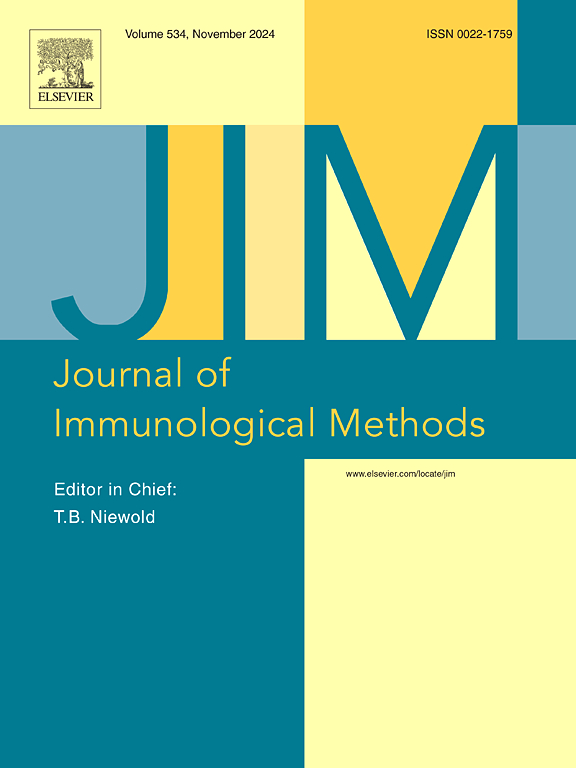一种硅片设计的多表位候选疫苗能有效地保护小鼠免受致病性志贺氏菌的侵袭
IF 1.6
4区 医学
Q4 BIOCHEMICAL RESEARCH METHODS
引用次数: 0
摘要
志贺氏菌仍然是一个主要的全球卫生问题,引起胃肠道感染,发病率和死亡率很高。耐抗生素志贺氏菌菌株的增加强调了迫切需要有效的疫苗。本研究在小鼠模型上评价了一种新型多表位重组蛋白疫苗对致病性志贺氏菌的免疫原性和保护效果。多表位抗原在大肠杆菌中表达并纯化用于免疫。对BALB/c小鼠进行皮下免疫,通过血清IgG定量(ELISA)和攻毒研究评估免疫应答。免疫小鼠的抗原特异性IgG滴度明显高于对照组(p <;0.05)。随后用10LD50的强毒弗氏志贺氏菌和博伊地志贺氏菌攻击显示出强大的保护作用,接种疫苗的小鼠在致命感染中存活下来。我们的研究结果表明,这在硅设计的多表位疫苗中引发了强有力的体液免疫,并赋予了跨物种保护,以对抗临床相关的志贺氏菌病原体。这些结果支持它作为一种有希望的候选疫苗的潜力,用于进一步开发针对志贺氏菌病的疫苗。本文章由计算机程序翻译,如有差异,请以英文原文为准。
An in-silico-designed multiepitope vaccine candidate can efficiently protect mice against pathogenic species of Shigella
Shigella species remain a major global health concern, causing gastrointestinal infections with significant morbidity and mortality. The rise of antibiotic-resistant Shigella strains underscores the urgent need for effective vaccines. This study evaluated the immunogenicity and protective efficacy of a novel multi-epitope recombinant protein vaccine against pathogenic Shigella species in a murine model. The multi-epitope antigen was expressed in E. coli and purified for immunization. BALB/c mice were subcutaneously immunized, and immune responses were assessed through serum IgG quantification (ELISA) and challenge studies. Immunized mice exhibited significantly higher antigen-specific IgG titers compared to controls (p < 0.05). Subsequent challenge with 10LD50 of virulent Shigella flexneri and Shigella boydii demonstrated robust protection, with vaccinated mice surviving lethal infections. Our findings indicate that this in silico-designed multi-epitope vaccine elicits potent humoral immunity and confers cross-species protection against clinically relevant Shigella pathogens. These results support its potential as a promising candidate for further vaccine development against shigellosis.
求助全文
通过发布文献求助,成功后即可免费获取论文全文。
去求助
来源期刊
CiteScore
4.10
自引率
0.00%
发文量
120
审稿时长
3 months
期刊介绍:
The Journal of Immunological Methods is devoted to covering techniques for: (1) Quantitating and detecting antibodies and/or antigens. (2) Purifying immunoglobulins, lymphokines and other molecules of the immune system. (3) Isolating antigens and other substances important in immunological processes. (4) Labelling antigens and antibodies. (5) Localizing antigens and/or antibodies in tissues and cells. (6) Detecting, and fractionating immunocompetent cells. (7) Assaying for cellular immunity. (8) Documenting cell-cell interactions. (9) Initiating immunity and unresponsiveness. (10) Transplanting tissues. (11) Studying items closely related to immunity such as complement, reticuloendothelial system and others. (12) Molecular techniques for studying immune cells and their receptors. (13) Imaging of the immune system. (14) Methods for production or their fragments in eukaryotic and prokaryotic cells.
In addition the journal will publish articles on novel methods for analysing the organization, structure and expression of genes for immunologically important molecules such as immunoglobulins, T cell receptors and accessory molecules involved in antigen recognition, processing and presentation. Submitted full length manuscripts should describe new methods of broad applicability to immunology and not simply the application of an established method to a particular substance - although papers describing such applications may be considered for publication as a short Technical Note. Review articles will also be published by the Journal of Immunological Methods. In general these manuscripts are by solicitation however anyone interested in submitting a review can contact the Reviews Editor and provide an outline of the proposed review.

 求助内容:
求助内容: 应助结果提醒方式:
应助结果提醒方式:


